13 Best Herbal Tinctures For Migraine
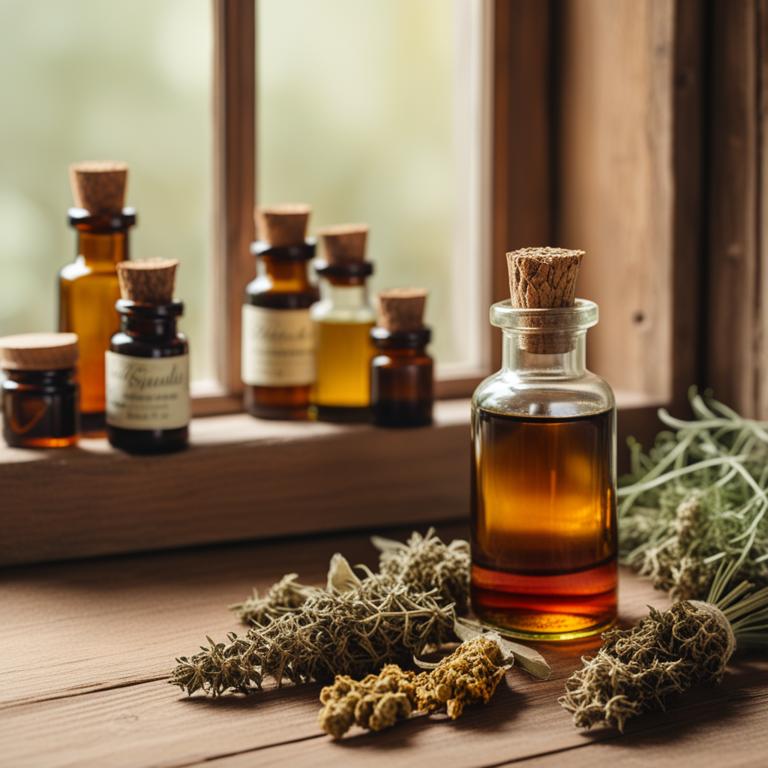
Herbal tinctures for Migraine are concentrated liquid extracts made from plants, flowers, and herbs, used to alleviate the symptoms of this debilitating condition.
These tinctures offer numerous benefits, including reducing inflammation, improving blood flow, and promoting relaxation, which can help to mitigate the severity and frequency of migraines.
Examples of herbal tinctures that have been found to be effective in treating migraines include Feverfew, which contains compounds that inhibit the production of prostaglandins, a key contributor to migraine pain; Ginger, which has anti-inflammatory properties that can help to reduce swelling and ease pain; Peppermint, which can help to relax tense muscles and improve blood flow; and Willow Bark, which contains salicin, a natural pain reliever similar to aspirin.
Additionally, other herbal tinctures such as Lavender, Passionflower, and Valerian Root have also been used to treat migraines due to their ability to promote relaxation, reduce anxiety, and improve sleep quality.
According to "Italian journal of pediatrics", tinctures for migraine, specifically those containing Andrographis paniculata, CoQ10, riboflavin, and magnesium, have been shown to reduce the frequency and pain intensity of migraines in children.
Below there's a list of the 13 best herbal tinctures for migraine.
- 1. Zingiber officinale tinctures
- 2. Curcuma longa tinctures
- 3. Silybum marianum tinctures
- 4. Foeniculum vulgare tinctures
- 5. Melissa officinalis tinctures
- 6. Matricaria chamomilla tinctures
- 7. Salvia officinalis tinctures
- 8. Valeriana officinalis tinctures
- 9. Paeonia lactiflora tinctures
- 10. Scutellaria baicalensis tinctures
- 11. Cinnamomum verum tinctures
- 12. Elettaria cardamomum tinctures
- 13. Passiflora incarnata tinctures
Also you may be interested in...
TODAY'S FREE BOUNDLE
Herb Drying Checklist + Herbal Tea Shopping List + Medicinal Herbs Flashcards
Enter you best email address below to receive this bundle (3 product valued $19.95) for FREE + exclusive access to The Aphotecary Letter.
$19.95 -> $0.00
1. Zingiber officinale tinctures

Zingiber officinale tinctures have been traditionally used to treat migraine due to their anti-inflammatory and analgesic properties, which help to alleviate symptoms associated with this condition.
The bioactive constituents, including gingerols and shogaols, present in these tinctures, exhibit potent anti-inflammatory and pain-relieving effects, making them an effective natural remedy for migraine relief.
By inhibiting the production of pro-inflammatory mediators and reducing pain sensitivity, Zingiber officinale tinctures help to provide quick and sustained relief from migraine symptoms.
Regular use of these tinctures may also help to reduce the frequency and severity of migraine attacks, providing significant benefits to individuals suffering from this debilitating condition.
Related Study
According to "Journal of ethnopharmacology", Zingiber officinale tinctures for migraine may exert abortive and prophylactic effects without any side-effects.
2. Curcuma longa tinctures

Curcuma longa tinctures have been traditionally used to treat migraine due to their anti-inflammatory, antioxidant, and analgesic properties.
The herbal preparation helps to alleviate migraine symptoms by reducing pain and inflammation in the blood vessels, as well as modulating the neurotransmitters that contribute to migraine attacks.
The bioactive constituents of Curcuma longa, such as curcumin, demethoxycurcumin, and bisdemethoxycurcumin, are responsible for its therapeutic effects, including inhibiting the production of pro-inflammatory enzymes and cytokines.
The benefits of using Curcuma longa tinctures to treat migraine include reduced frequency and severity of attacks, improved quality of life, and a natural alternative to conventional medications with minimal side effects.
Related Study
According to "Phytotherapy research : PTR", Curcuma longa tinctures for migraine showed positive, preliminary findings as a prophylactic treatment.
3. Silybum marianum tinctures
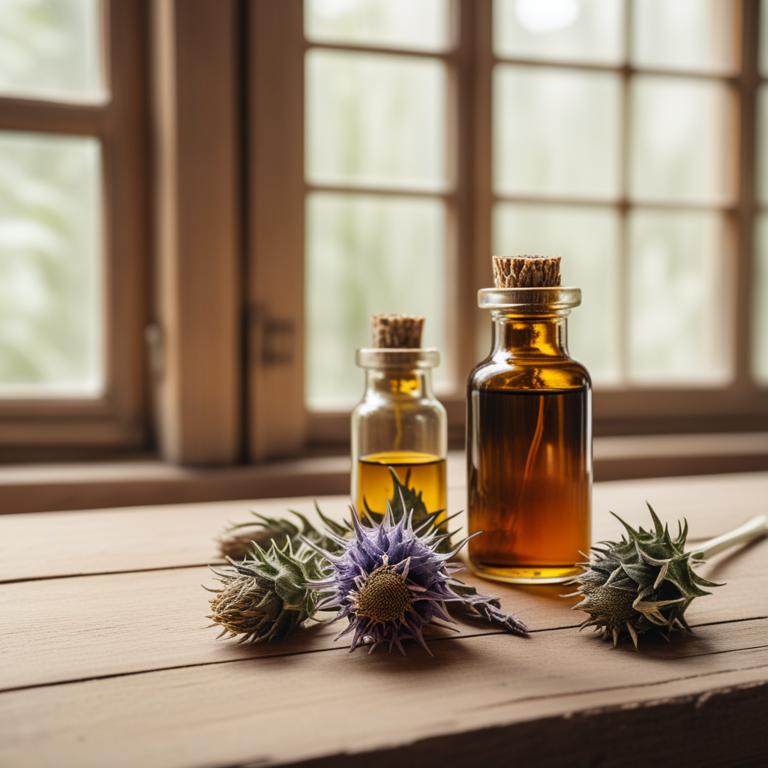
Silybum marianum tinctures have been traditionally used to treat migraine due to their anti-inflammatory and vasodilatory properties.
The herbal preparation helps to alleviate migraine symptoms by reducing inflammation and promoting blood flow to the brain, thus providing relief from pain and discomfort.
The bioactive constituents present in Silybum marianum tinctures, such as flavonoids and silymarin, contribute to their therapeutic effects by scavenging free radicals and inhibiting the release of pro-inflammatory mediators.
The benefits of using Silybum marianum tinctures to treat migraine include reduced frequency and severity of episodes, improved quality of life, and a natural alternative to conventional medications.
4. Foeniculum vulgare tinctures
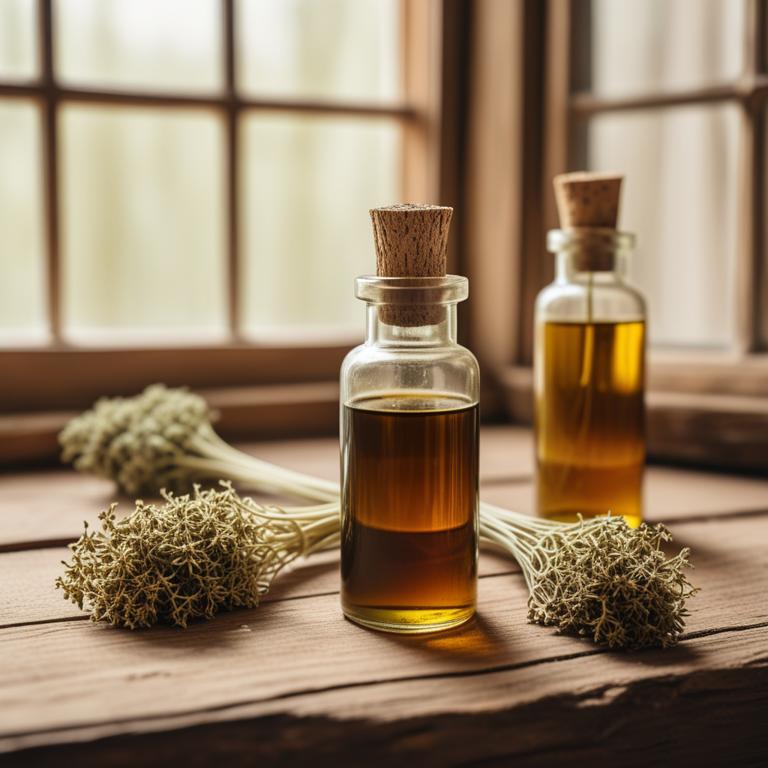
Foeniculum vulgare tinctures, derived from the seeds of the common fennel plant, have been used to treat migraine ailments due to their anti-inflammatory and analgesic properties.
The bioactive constituents such as anethole, limonene, and fenchone present in these tinctures help to alleviate migraine symptoms by reducing pain and inflammation.
By acting as a natural antispasmodic, Foeniculum vulgare tinctures can help to relax the muscles and blood vessels, thus reducing the frequency and severity of migraine attacks.
The benefits of using Foeniculum vulgare tinctures to treat migraine include reduced pain, improved sleep quality, and a decrease in the reliance on conventional medications.
5. Melissa officinalis tinctures
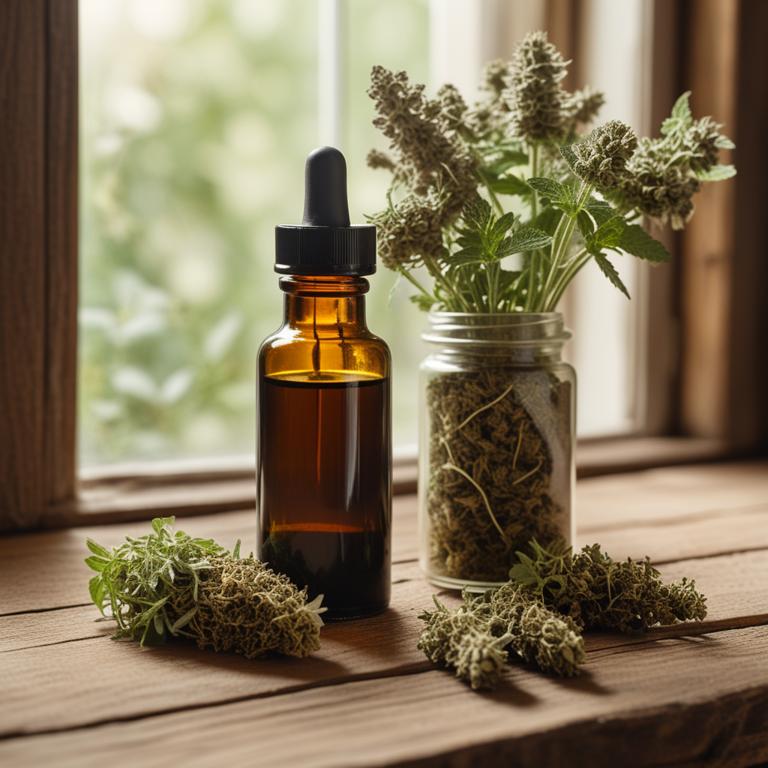
Melissa officinalis tinctures have been traditionally used to treat migraine ailments due to their calming and anti-inflammatory properties.
The bioactive constituents, such as linalool and linalyl acetate, in Melissa officinalis tinctures help to reduce stress and anxiety, which are often triggers for migraines.
By promoting relaxation and reducing inflammation, Melissa officinalis tinctures can help alleviate migraine symptoms and provide relief from pain and discomfort.
Regular use of Melissa officinalis tinctures may also help to prevent migraines from occurring, making it a beneficial herbal preparation for those suffering from this condition.
Related Study
According to "Avicenna journal of phytomedicine", Melissa officinalis tinctures were among the most frequently used and reported plants for treating nervous disorders, including migraine, in the study conducted in Bojnord, northeastern Iran.
6. Matricaria chamomilla tinctures
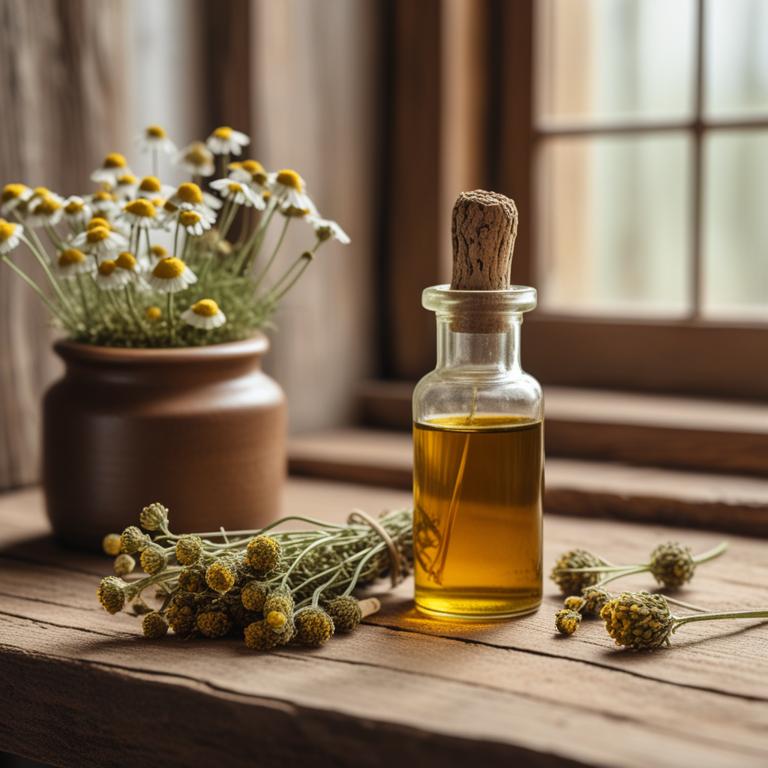
Matricaria chamomilla tinctures, derived from the daisy-like flowers of the chamomile plant, have been used for centuries to alleviate migraine symptoms.
The anti-inflammatory and analgesic properties of this herbal preparation help to treat migraine by reducing pain and swelling in the blood vessels, which can contribute to migraine episodes.
The bioactive constituents, including apigenin and luteolin, are responsible for the sedative and spasmolytic effects that help to relax the muscles and reduce migraine severity.
The benefits of using Matricaria chamomilla tinctures to treat migraines include reduced frequency and severity of attacks, improved sleep quality, and a decrease in the need for medication.
Related Study
According to "Phytotherapy research : PTR", Matricaria chamomilla tinctures for migraine showed positive, preliminary findings as an acute treatment.
7. Salvia officinalis tinctures
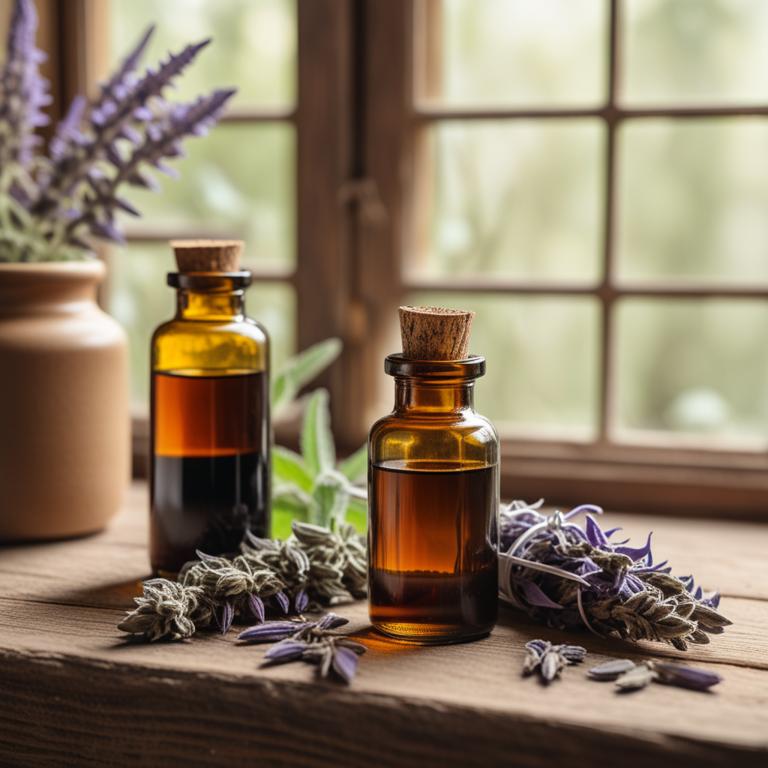
Salvia officinalis tinctures have been traditionally used to treat migraine ailments due to their anti-inflammatory, antioxidant, and spasmolytic properties.
The bioactive constituents of Salvia officinalis, such as rosmarinic acid, carnosic acid, and ursolic acid, help to reduce inflammation, relieve pain, and relax blood vessels, which are common factors contributing to migraines.
By using Salvia officinalis tinctures, individuals may experience relief from migraine symptoms, including reduced frequency and severity of attacks, and improved overall quality of life.
The benefits of using Salvia officinalis tinctures to treat migraines include reduced reliance on pharmaceutical medications, fewer side effects, and a more natural approach to managing this debilitating condition.
8. Valeriana officinalis tinctures
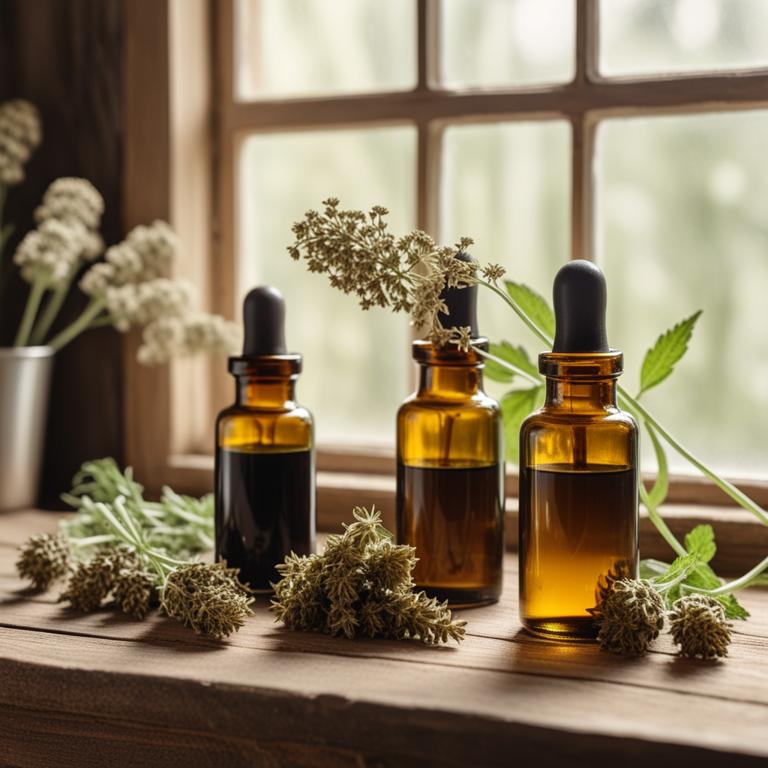
Valeriana officinalis tinctures have been traditionally used to treat migraine due to their sedative, antispasmodic, and analgesic properties, which help to alleviate the severity of migraine symptoms.
The herbal preparation helps to treat migraine by reducing inflammation, relieving muscle tension, and promoting relaxation, thereby minimizing the frequency and intensity of migraine attacks.
The bioactive constituents of Valeriana officinalis, including valepotriates, isovalerenol, and valerenic acid, are responsible for its therapeutic effects on migraine, as they interact with the body's GABA receptors to produce a calming effect.
The benefits of using Valeriana officinalis tinctures for migraine treatment include reduced frequency and severity of attacks, improved sleep quality, and a decrease in reliance on pharmaceutical medications.
Related Study
According to "World journal of plastic surgery", Valeriana officinalis tinctures may be beneficial in reducing migraine pain, as the study found a significant decrease in pain score in the acute phase after administering valerian root extract.
9. Paeonia lactiflora tinctures

Paeonia lactiflora tinctures are a natural herbal remedy that has been used to treat migraine headaches due to their analgesic, anti-inflammatory, and spasmolytic properties.
The bioactive constituents present in these tinctures, including peonidin and isopeonidin, help to relax blood vessels, reduce muscle spasms, and alleviate pain, thereby providing relief from migraine symptoms.
By inhibiting the release of pain-causing chemicals and promoting the production of endorphins, Paeonia lactiflora tinctures help to reduce the severity and frequency of migraine attacks, providing a safe and effective alternative to conventional medications.
Regular use of these tinctures has been shown to offer long-term benefits in managing migraine symptoms, promoting overall well-being, and improving the quality of life for individuals suffering from this debilitating condition.
10. Scutellaria baicalensis tinctures
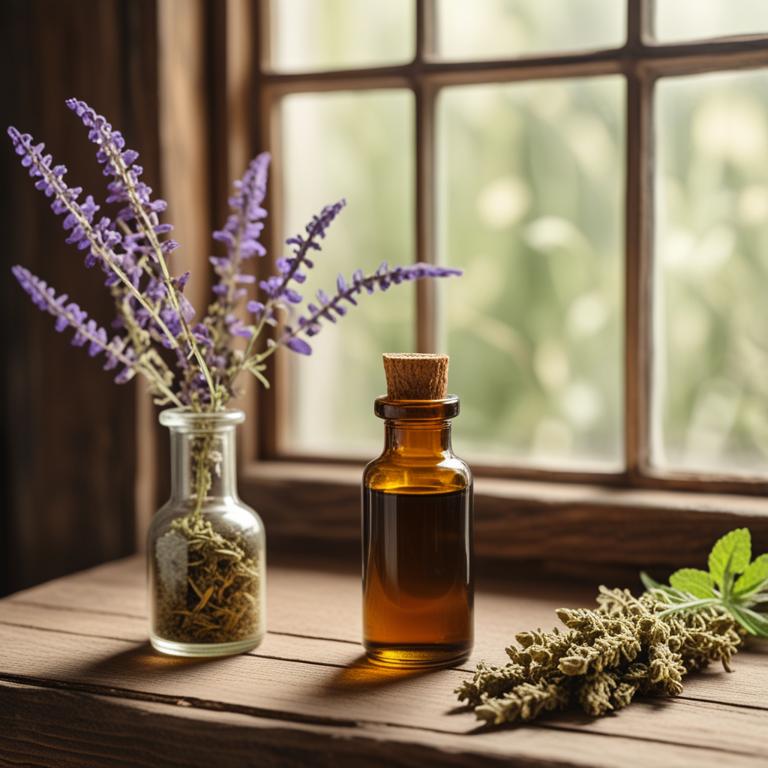
Scutellaria baicalensis tinctures have been traditionally used to treat migraine ailments due to their analgesic and anti-inflammatory properties.
The bioactive constituents of Scutellaria baicalensis, including baicalein, baicalin, and wogonin, help to alleviate migraine symptoms by inhibiting the release of pro-inflammatory cytokines and reducing the activity of pain-sensing neurons.
These herbal preparations work by modulating the body's response to pain and reducing the severity of migraine attacks, providing relief from associated symptoms such as nausea and sensitivity to light and sound.
The benefits of using Scutellaria baicalensis tinctures to treat migraines include reduced frequency and severity of attacks, improved overall quality of life, and a natural alternative to conventional medications.
11. Cinnamomum verum tinctures
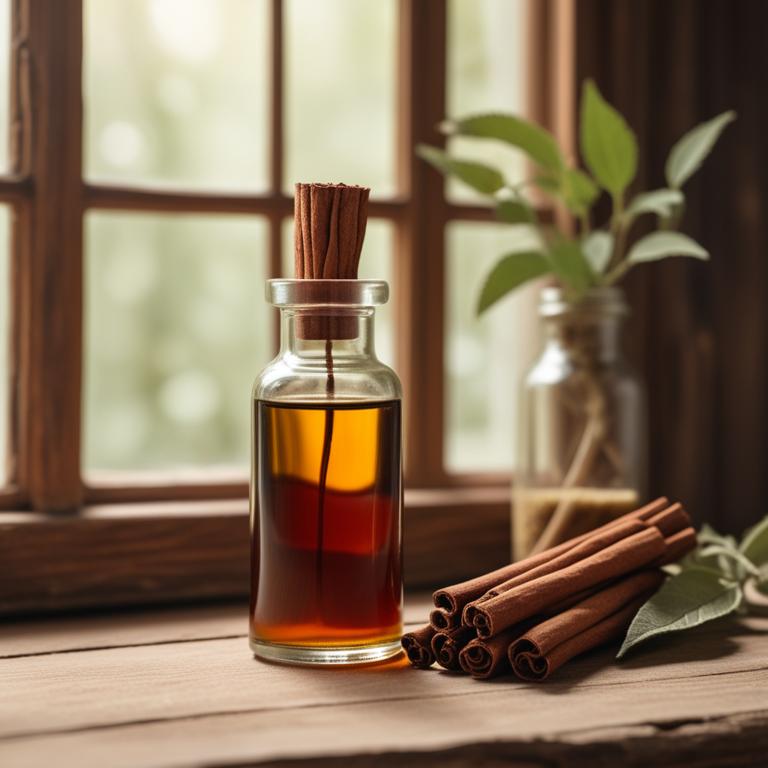
Cinnamomum verum tinctures, derived from the bark of the Ceylon cinnamon tree, have been traditionally used to treat migraines due to their analgesic, anti-inflammatory, and antioxidant properties.
The bioactive constituents present in these tinctures, including cinnamaldehyde and eugenol, help to ease migraine symptoms by inhibiting the production of pro-inflammatory compounds and relaxing tense muscles.
By reducing pain and inflammation, Cinnamomum verum tinctures provide relief from migraine symptoms, making them a valuable natural remedy for this debilitating condition.
The benefits of using Cinnamomum verum tinctures to treat migraines include reduced frequency and severity of attacks, improved sleep quality, and a decrease in reliance on pharmaceutical medications.
12. Elettaria cardamomum tinctures
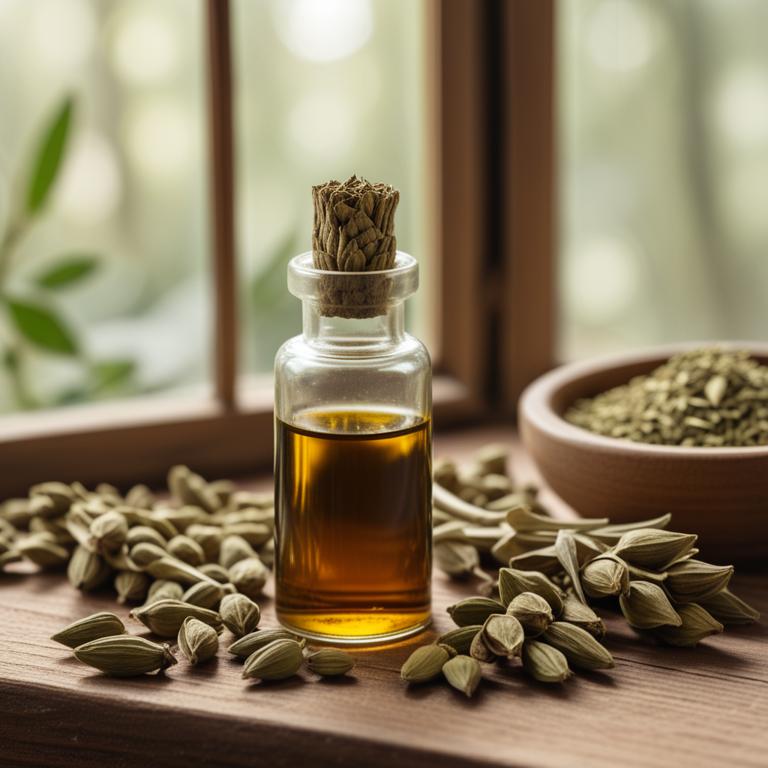
Elettaria cardamomum tinctures have been traditionally used to treat migraines due to their anti-inflammatory and analgesic properties.
This herbal preparation helps to treat migraines by reducing inflammation and pain in the brain and blood vessels, thereby relieving symptoms such as headaches and nausea.
The bioactive constituents of Elettaria cardamomum tinctures, including limonene, linalool, and cineol, have been found to have anti-inflammatory and pain-relieving effects that contribute to its efficacy in treating migraines.
The benefits of using Elettaria cardamomum tinctures to treat migraines include its non-habit-forming nature, minimal side effects, and potential to reduce the frequency and severity of migraine attacks.
13. Passiflora incarnata tinctures
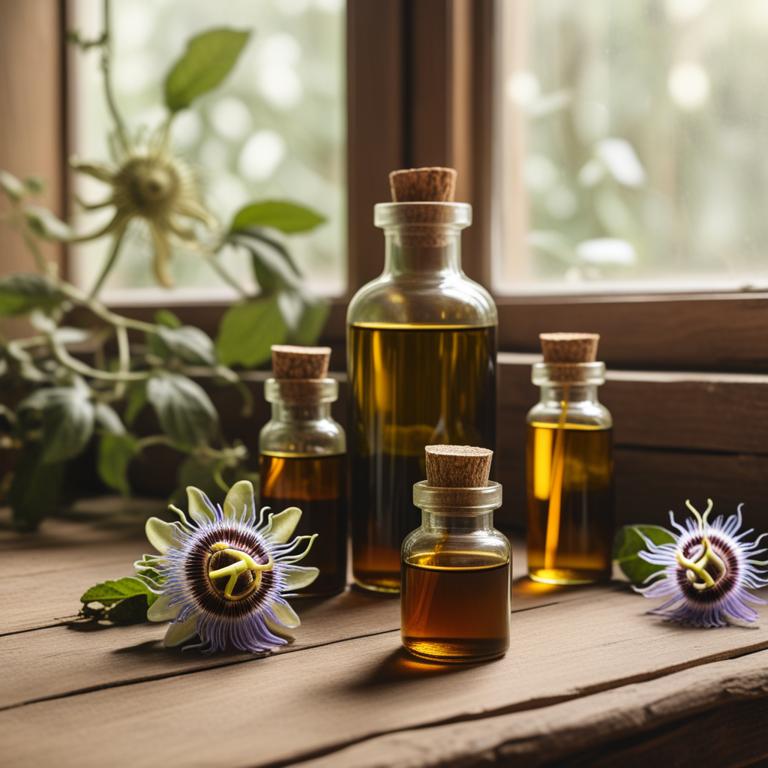
Passiflora incarnata tinctures have been traditionally used to treat migraines due to their ability to reduce anxiety and promote relaxation, thereby alleviating the symptoms associated with this condition.
This herbal preparation contains bioactive constituents such as flavonoids, alkaloids, and glycosides, including flavonoids like kaempferol and quercetin, which have anti-inflammatory and antioxidant properties that help to mitigate migraine pain.
The flavonoids and other bioactive compounds in Passiflora incarnata tinctures may also help to modulate neurotransmitter activity, reducing the severity and frequency of migraine episodes.
By promoting relaxation, reducing anxiety, and exerting anti-inflammatory effects, Passiflora incarnata tinctures offer a natural and potentially effective treatment option for managing migraines.